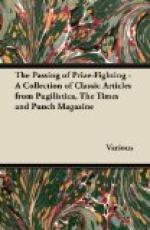* * * * *
[Illustration: LOOKING AHEAD.
Miss Golightly (the Friend of the Family, and to whom Sir Percy (the elder) has proposed). “OF COURSE I’M AWFULLY OBLIGED, SIR PERCY—BUT, SAY NOW, DON’T YOU THINK THERE WOULD BE SOME DANGER OF MY FALLING IN LOVE WITH YOUR ELDEST SON?”]
* * * * *
MR. CHAUNCEY DEPEW, the well-known American lawyer, wonders why on earth the British Government has not long ago given Home Rule to Ireland. He encourages Mr. G.’s Ministry to do their best in this direction, and chaunce-y it. We’re always delighted to welcome Mr. CHAUNCEY DEPEW in England, so let him come over with a Depewtation to Mr. G. on the subject.
* * * * *
EQUESTRIAN FRUIT.—At the Horticultural Show the Baroness BURDETT-COUTTS exhibited a “Cob of ADAM’s Early Maize.” No particulars are given. Was it 14’1 and a weight-carrier? Being ADAM’s, it must be about the oldest in the world. “Maize” may be a misprint for “Mews.” Next time the Baroness must send a pear.
* * * * *
PROBABLE DEDUCTION.—A pertinacious Salvation Army Captain was worrying a Scotch farmer, whom he had met in the train, with perpetual inquiries as to whether “he had been born again of Water and the Spirit?” At last, MCSANDY replied, “Aweel, I dinna reetly ken how that may be, but my good old feyther and mither took their toddy releegiously every nicht, the noo.”
* * * * *
THE AUSTRO-GERMAN OFFICER’S VADE-MECUM.
Q. You have heard of the Ride from Berlin to Vienna, and vice versa?
A. Yes; and of the mishaps that befell many of the competitors.
Q. You mean their horses?
A. What applies to the one applies to the other.
Q. Some of the poor steeds died on the journey?
A. I daresay—of course, it was hard work.
Q. And you have read that, even when the poor horses were fainting and refusing food, the riders still went on?
A. Of course. The riders had magnificent pluck and nerve.
Q. What, to observe the anguish of their chargers without emotion?
A. No! The idea! I mean they had pluck and nerve in spite of all discouragement to push on to the winning-post.
Q. And what do you think this breaking down of the horses proved?
A. That, after all, the creatures were brutes—only brutes!
Q. Does not the suffering of these brutes suggest—
A. That the riders were brutes too?—Ah!
[No further question put,
the Answerer having mastered the
subject.
* * * * *




